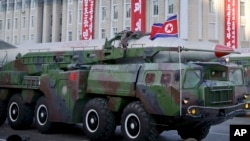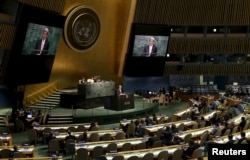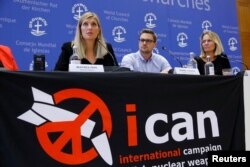North Korea's commitment to the denuclearization of the Korean Peninsula is expected to be a key issue for discussion at next week's 2018 Preparatory Committee for the 2020 Nuclear Non-Proliferation Treaty Review Conference.
"The United States remains committed to a complete, verifiable and irreversible denuclearization of North Korea," said Robert Wood, U.S. ambassador and permanent representative to the conference on disarmament.
"We will be looking at this preparatory meeting to continue to put pressure on North Korea to fulfill its obligations," he added.
But that will be difficult to do within the context of the meeting as North Korea opted out of the NPT in 2003, the first state ever to withdraw from the treaty.
Next week's meeting in Geneva, which runs from April 23 to May 4, is the second of three planned sessions to be held prior to a 2020 review conference on the treaty.
The five nuclear weapons nations — the United States, Russia, China, the United Kingdom and France — are among 191 countries that have joined the NPT, which came into force in 1970.
"It has been one of the most successful treaties in human history," Wood said.
International unity
However, he agreed that the failure of four other countries that have or are believed to possess nuclear weapons — India, Pakistan, Israel and North Korea — to join the treaty is of concern.
He warned that the international security environment is rapidly deteriorating and the challenges posed by North Korea's nuclear and ballistic missile programs made it critical for parties "to come together to strengthen the treaty."
He acknowledged that strong divisions in the disarmament community are problematic.
"The conditions right now are not ripe for nuclear disarmament, but as a community, we need to work together to create those conditions," he said.
The Nobel Peace Prize-winning organization, ICAN, the International Campaign to Abolish Nuclear Weapons, was not sympathetic to that argument. Beatrice Fihn, director of ICAN, accused the five nuclear weapons states of "sabotaging the treaty."
"They are not taking action to move toward nuclear disarmament as agreed to under their treaty obligations," she said, claiming that they, along with the four nuclear-armed states outside the treaty, were modernizing and upgrading their arsenals.
Fihn singled out the threats posed by North Korea, which continued to test nuclear weapons. She expressed concern about the extremely tense and dangerous standoff between North Korea and the United States in the last couple of months.
She told VOA that she was somewhat heartened at the prospect of a possible U.S.-North Korean summit in coming weeks.
"I am not quite sure what to make of this meeting, ... but it looks promising that there is interest in finding a diplomatic solution," she said, adding. "I think it is unlikely that one of the nine nuclear arms states will simply give up their nuclear weapons, if the other nuclear arms states continue to threaten to use nuclear weapons.
"It is impossible to address the North Korean nuclear arsenals without looking at nuclear arsenals in general."
U.S. Ambassador Wood said it is important to maintain pressure on North Korea until it is clear that Pyongyang is serious about getting rid of its nuclear weapons.
"We have a long way to go, and I think the upcoming summit to take place between Kim Jong Un and U.S. President Donald Trump is clearly a momentous time and we hope to make progress," he said.
"The president will be going into this meeting with his eyes wide open," he added. "The United States is not naive about the situation. But, it is an opportunity and hopefully it will lead to some success."
Iran treaty
The Iran nuclear agreement that was negotiated under the Obama administration is an issue that could prove to be a deal-breaker with North Korea. Trump has to make a decision by May 12 regarding the future of U.S. participation in the Iranian Joint Comprehensive Plan of Action, JCPOA.
"We and some of our European friends are trying to work on a supplemental agreement, to try to deal with some of the major concerns we have about the JCPOA," Wood told VOA. "Those discussions are ongoing, and they are intense.
"We are hopeful that an agreement can be reached that the president can feel comfortable with," he said.
ICAN's Fihn told VOA it would be dangerous for the United States to withdraw from the agreement.
"I think it would be extremely concerning and worrying if the United States would pull out of a treaty, an agreement with Iran that works; that prevents Iran from developing nuclear weapons; that puts on Iran the strongest verification and safeguards that any state has at all.
"It would be a security concern for the United States. It would be a security concern for the whole world if this deal falls apart," she said. "And, in particular, it would send a very worrying message to a country like North Korea."









